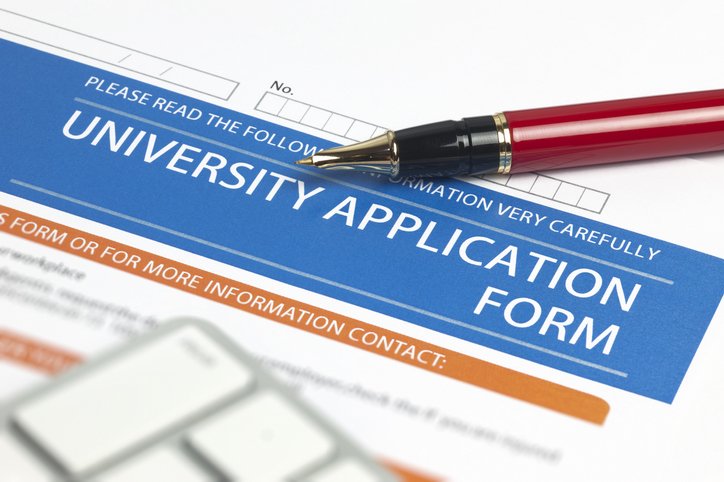The Complete Guide to Applying to College
In our role as educational consultants, we receive most frequently questions about applying to college: When do I start? What do I do? When should I be finished? The list goes on. Our recent posts have focused on various aspects of the college application, including what’s needed and how long applications take to complete. We’ve put together a short, yet sweet, complete guide to applying to college. Today’s post will cover the following:
- When should you start applying for college?
- What are the college application steps?
- Where can I get help with the college application?
- How do I prepare for college application essays?
- How can I increase my chances of getting into my dream school?
- What else do I need to know?
Continue reading for everything you need to know about applying to colleges!

When to Start Applying for College
It’s important to begin the college application process early! There are tasks for you to complete both junior and senior years, and the sooner you start, the more manageable the process will be. Check out our blog post "When to Start Applying to College – A Detailed Timeline."
What to Expect Your Junior Year of High School
Much of junior year will be devoted to test prep (that’s your SAT or ACT) and researching colleges so that you can create your list. Focus on your junior year academics: grades and course rigor are the topmost factors that colleges look for, so make this year shine! Junior year is also an excellent time to ask for letters of recommendation towards the end of the year, and to review your extracurricular involvement. Take this time to add a leadership position or two to your activity list, or plan an individual research project. If you need a certain number of community service hours to fulfill graduation requirements, take care of the bulk of those junior year and the following summer before senior year. Use this summer to apply for scholarships, make up any course/credit deficiencies, and jumpstart college applications and essay writing.
What to Expect During Your Senior Year of High School
Moving into your senior year, you’ll finish up all tasks related to the college application. This includes completing and submitting the application itself with any essays a college requires (remember, “optional” nearly always means “required”!). You’ll want to ensure the timely submission of transcripts, test scores, and letters of recommendation. You’ll have time early in the fall, if needed, to take another SAT or ACT. You’ll want to submit everything at least two to three days before a college’s deadline—ideally a good ten days before. Submitting early keeps you organized and prevents missed deadlines. Finishing all college applications early (we recommend by Thanksgiving week) also gives you a chance to enjoy your senior year.

The College Application Steps
Here’s a quick breakdown of your tasks over junior and senior year, in the order in which to complete them:
Choosing Colleges for Your List
Before you can apply to college, you’ll need to create your college list! It should be one that is carefully researched (hint: start early to give yourself time to do this) and composed of mostly targets and safeties, with a few “reach” colleges, just because! You can visit campuses, either in-person or virtually (see a college’s website for touring information and any visitor restrictions), attend college fairs, and check out websites, books, blogs, and other college resources. Create a spreadsheet to track your college list with pertinent details, including specific requirements and deadlines.
Acquiring Letters of Recommendation
The best letters of recommendation come from a junior-year core academic teacher (think: English, math, science, social studies, or world language). Early in your junior year, establish a good relationship with one or two of your teachers so you can confidently, yet humbly, approach them at the end of the year to ask for a recommendation. Even if you don’t have a top-top grade in that class, it’s still perfectly fine to ask for a recommendation if you have pushed yourself in that class regardless of grades as long as your effort was evident. If you forgot to ask for a letter of recommendation before going on summer break, be sure to do so as soon as you return to school!
Passing Your SAT/ACT
Recall that we said you will spend junior year preparing for your SAT or ACT, and we’ve offered advice and resources on how to study for these exams. “Passing” your test means that your score has met or exceeded admitted students’ mid-50% range of scores, a good indication that you’re a qualified candidate for admission. Keep studying!
Filling Out the College Applications
You’ll spend the first month or so of senior year filling out college applications, using a platform such as the Common App, or a college’s own online application. Completing this document can take a few hours and must be carefully reviewed prior to submission. Don’t forget that a college application will likely include essay prompts, so it’s even a good idea to begin your applications in the summer before senior year.
Applying for Financial Aid, Scholarships and Grants
While you can research and apply for private scholarships the summer after junior year, you will have to wait until October 1 of your senior year before your family can fill out the FAFSA, the form required by every college to apply for financial aid. Like applications, financial aid forms also have deadlines which colleges will make clear on their admissions or financial aid websites. Want to be considered for a merit scholarship? Check those deadlines! Colleges often have a priority deadline for filing an application for scholarship consideration. Usually, these deadlines fall around November 1, so make sure your applications are ready to go beforehand. Always confirm any deadlines with the colleges themselves.
Getting Help with Your College Applications
Feeling a little overwhelmed as you work through your college applications? Ask for help! There are plenty of excellent resources you can turn to when you get stuck:
Contact Your High School Guidance Counselor
Your guidance counselor can help you narrow your college list and find schools that best suit you. He or she will outline the application process from start to finish and guide you to complete each step. Need to send a transcript to a college or other program? Check with your counselor – typically the guidance office is responsible for sending out all documents. Your counselor may offer career interest or college surveys to help you further discern your post-high school plans.
Go to Your Prospective College’s Admissions Office
Have a question about a college that cannot be answered through your own research? Contact that school’s admission office. Before you call (or email), see if you can locate the name and contact information for your regional rep (the admissions officer in charge of your geographic region, often the one doing the first review of your application). Reach out to your rep in a polite email or phone call, and always thank him/her for his/her time and help.
Don’t forget other great resources you can turn to when you need help with your college applications. A teacher can give you support and mentorship. A tutor can help you keep up your grades and study for your SAT or ACT. As you apply to colleges, a qualified educational consultant with years of very specific experience can give you individualized advice and feedback. Don’t overlook these trusted resources!

How to Write a Great College Essay
The college application essay (in many instances, more than one) will be one of the most time-consuming parts of the application. You’re asked to tell a story about yourself and reflect on its meaning, and you may also be asked to write about why you're applying to this college or are interested in a a specific major. Here are a few tips to help you stay on task for this important application piece:
Write Several Drafts
A good piece of writing rarely emerges on the page fully polished and intact from the writer’s mind. Your rough draft will be exactly that – rough! Use early drafts to get ideas down on the page, and use later ones to revise and proofread until your essay flows beautifully. Some student writers are proficient enough to churn out a good copy in only a few drafts, but most need more than that, depending on aptitude and motivation. Trust the process and work through your drafts. A good essay will soon shine through!
Have Someone Else Review Your Essay
Before you typically upload your essay into your college application, have a trusted adult like a parent, teacher, or tutor review your draft. They can help you determine the clarity and flow of your writing, and also catch errors. You should do all work for your essay, but it never hurts to have a second set of eyes scan the final piece. Remember, the essay is your story, but allow others to give you guidance before you hit submit.
Begin Writing as Early as Possible
A good college essay takes time, so you should start writing it as soon as you can. Many rising seniors find the summer after junior year the best time to work on essays. Why? You’ll simply have more time and patience to write drafts before you get started with your senior academics. Part of the college essay writing process includes organizing all essays that you’ll have to write: in addition to the personal statement, you may have to write other “supplemental” essays for some of the colleges on your list. Take note of the number and length, and plan accordingly.

Increasing Your Chance of Getting into College
As you work on college applications, you may wonder about the likelihood of receiving an offer of admission, and what, if anything, you can do to improve your chances. Below, we’ve provided some suggestions for understanding your admission chances and some steps to improve them.
Determining Your Chance of College Admission
You can use a college’s admitted student profile page to get a reasonable understanding of your admission chances. The profile generally shares mid-50% GPA and test scores, as well as some other interesting data about the most recently accepted class. You may see demographics, extracurricular involvement, and top major selections. The academic data will be most useful in assessing your admissions chances. Compare your grades and GPA to those of the average admitted students’ and see how you line up.
Tips for Getting into College
In order to improve your chances for getting into college, you can take some steps now to strengthen your admissibility. Juniors, make sure you’re working your hardest throughout this critical year and that you’re challenging yourself appropriately. Seniors, ensure that your grades are where they need to be, and use the summer to make up any course deficiencies or even get a head start on next year’s core course schedule. Don’t have time to fit an AP class into your schedule? Find opportunities to take one over the summer. Prepare for your SAT or ACT, if you still need to test. Ask for help from your teachers or a tutor before it’s too late! Also, craft your college application plan carefully. Applying early can give a boost to your chances; pay attention to early deadlines so as not to miss them. Demonstrate your interest in the colleges on your list – for many schools, showing interest is another way of improving your chances for admission. Open an email, attend an online session, connect with an admissions officer at a college fair. Stay in touch, even after you’ve hit submit!
What else do I need to know about applying to college?
- How do I apply for college during a gap year?
- How long do college applications take?
- What should I do after I apply to college?
In Conclusion
We trust that this guide will help you get started and stay on track as you work on your college applications. If you need some help, reach out! Our experienced team of educational consultants, tutors, and other learning specialists are here to help you. Give us a call today.
